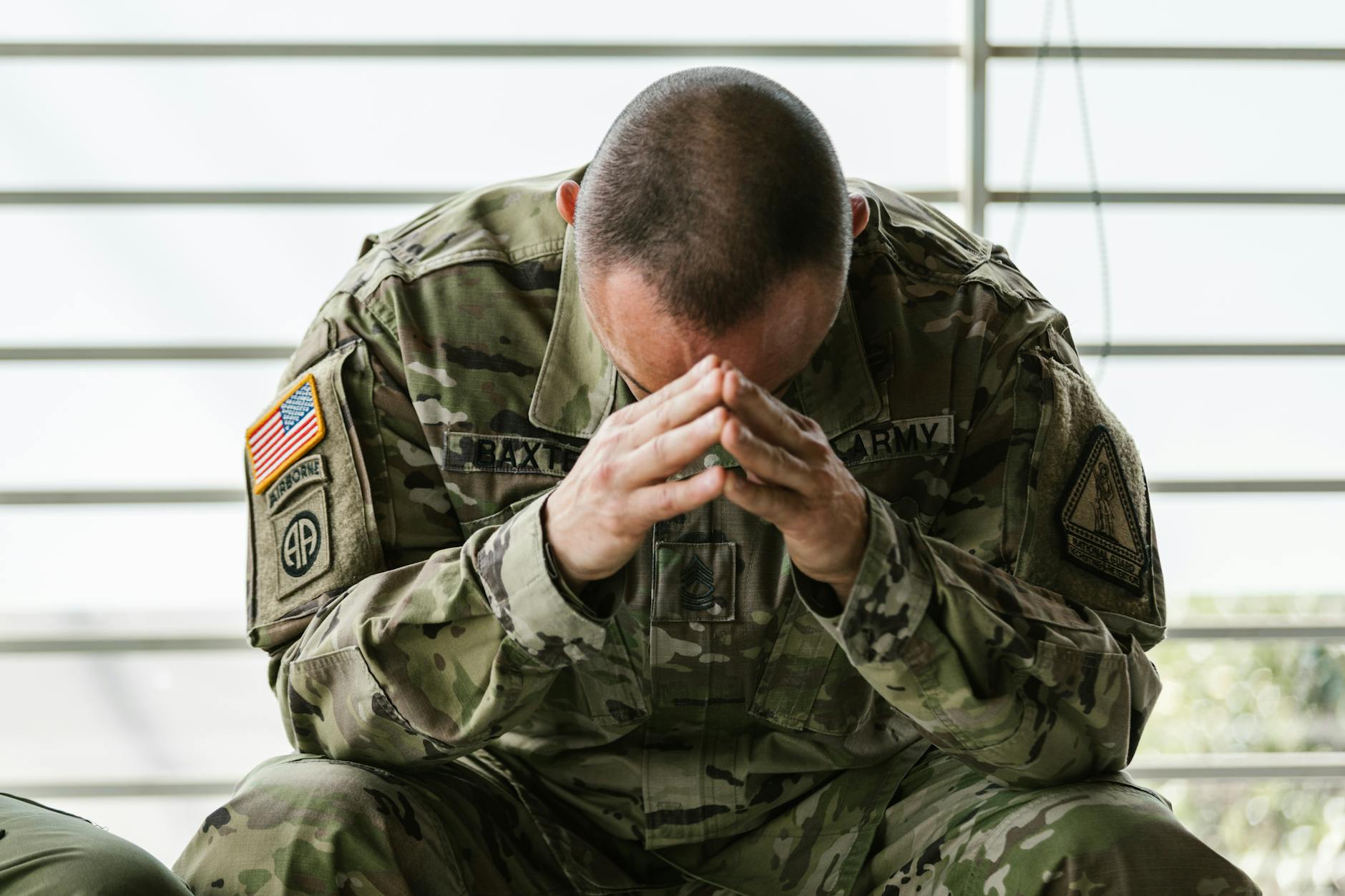
More veterans have died by suicide from PTSD than have from wars since 9/11.1 That is a staggering and heartbreaking statistic. Current interventions to help veterans have fallen short, but psychedelics have shown real promise in helping those suffering with PTSD. According to the Heroic Hearts Project, over 80% of psychedelic program participants see improvement after one psychedelic program.2 As more and more stories emerge around the success of treating PTSD with psychedelics, it has caught the attention of the VA and Congress who are working on ways to study them more and give access to veterans.3
I have met multiple individuals that have had PTSD from various backgrounds who have had immense success treating it with psychedelics, psilocybin-assisted therapy in particular. That does not mean it’s a guarantee, but for many, it has been a life-changing treatment. It being a new treatment option, it is important to approach it with care: learn about it, speak with others who have done it, and make sure you access it safely and with a practitioner you trust. We’ll help you learn how below:
1. Current Research and Potential Benefits
While the research is new and emerging, there is much promise for psychedelics. Here’s an overview of some popular psychedelics used:
Psilocybin-Assisted Therapy: Psilocybin, the active ingredient in “magic mushrooms,” is being studied for its potential to help with PTSD, as well as depression and anxiety, which often co-occur with PTSD. Anecdotally, many veterans have had success using psilocybin to treat PTSD, though more thorough research is needed in this area.
MDMA-Assisted Therapy: MDMA, commonly known as “ecstasy” or “molly,” is being studied in clinical trials for its potential to reduce PTSD symptoms. Results from studies conducted by organizations like MAPS (Multidisciplinary Association for Psychedelic Studies) have shown that after three session, 67% of participants no longer qualified as having PTSD.4
Ibogaine: Ibogaine is an alkaloid extracted from the iboga tree root bark, traditionally used by the Bwiti people of Gabon in religious ceremonies. Some veterans are using ibogaine to treat PTSD, traumatic brain injury, and depression, and they have reported dramatic improvements, including the ability to perform simple daily tasks.5
Ayahuasca: Ayahuasca is a psychedelic brew of two plants, used as a sacrament in South American countries, that produces a profound psychedelic effect. Ayahuasca has been explored as an antidepressant agent and appears to be safe, with no neurocognitive effects observed even in children exposed to small doses.6 Ayahuasca is a pro-serotonergic drug like psilocybin, and like psilocybin, may be useful for similar conditions.
There are a number of other types of psychedelics as well, like Ketamine and DMT, that are being studied and showing effectiveness with PTSD. All of these therapies are typically conducted in controlled environments with trained professionals, combining the psychedelic experience with psychotherapy, a key component of the treatment.
2. How do Psychedelics Help?
Psychedelics, particularly psilocybin and MDMA, may help with PTSD by enabling individuals to reprocess their trauma, gain new perspectives, and alter brain connectivity. These changes can lead to lasting effects and improvements in mental health.
Here’s a breakdown of how psychedelics may work in the context of PTSD. Hold on, we’re going to get a little more science here:
-
- Reprocessing Trauma: Psychedelics like psilocybin and MDMA can allow individuals to reprocess traumatic memories in a way that has lasting effects. This reprocessing can occur when individuals re-experience traumatic memories but are able to view them in a new light.
- Memory Re-consolidation: Psychedelics may alter the way traumatic memories are stored and recalled, which can help in reconsolidating these memories. This process is consistent with current understandings of how memory works, and it suggests that psychedelics can change the emotional weight and impact of those memories.7
- New Perspectives and Insights: Psychedelics can facilitate a new way of seeing old problems. This may include gaining a new perspective on the self, leading to self-empathy and forgiveness. These shifts in perspective can be critical in overcoming the negative thought patterns often associated with PTSD.
- Changes in Brain Connectivity: Psychedelics can modify connections between brain networks:
-
- They can unpair negative systems attached to self-representation, making people feel less stuck.8
- Psilocybin, in particular, has been shown to decrease connectivity within the default mode network (DMN), which is often hyperactive in individuals with depression and PTSD.9
- This modulation of brain networks may also promote integration between the DMN and other brain networks, such as the executive and salience networks, which may reduce rumination and improve overall functionality.
-
- Serotonin Receptor Activation: Psilocybin primarily targets the serotonin 2A (5-HT2A) receptor. This activation leads to changes in neural circuitry, contributing to improvements in mood and relief from compulsive behaviors.
- Neuroplasticity: Psychedelics can increase neuroplasticity.10 This increases new learning in the brain, new relationships between sensory and emotional states, and the rewiring of thought patterns.
- Emotional Regulation: By modulating the prefrontal cortex and limbic regions (including the amygdala), psychedelics may help improve emotional regulation:
-
- Psychedelics can reduce activity in the amygdala in response to threat-related stimuli, which may reduce negative mood states.
- They may also help normalize hyperactivity in the medial prefrontal cortex (mPFC), which is commonly seen in depression.11
-
- Letting Go: A crucial aspect of psychedelic therapy involves “letting go” or relinquishing control. This concept is similar to the “exposure response prevention therapy” used in traditional treatment of PTSD, where patients are encouraged to confront their fears without avoidance.12
It is important to note that psychedelic-assisted therapy is not just about taking a substance. It also involves creating a safe and supportive therapeutic setting and integrating the experience with psychotherapy to achieve the best results.
2. Safety and Risks
It is best to use psychedelics after assessing any potential medical risks first, and then only with a trusted practitioner who can guide you through the process. As with anything, there are risks:
-
- Psychedelics can cause profound psychological effects, and unsupervised use may exacerbate trauma or lead to adverse experiences.
- Possible side effects include anxiety, paranoia, and increased emotional sensitivity.
- For individuals with a history of certain mental health conditions (e.g., schizophrenia or bipolar disorder), psychedelics may pose significant risks.
If you are curious as to your own personal risk and safety engaging with psychedelics, we have a free safety assessment you can take. This is a brief survey that will generate a report for you outlining risks. We can even set you up with a call with a qualified professional to walk you through your results.
3. Legality
Psychedelics remain classified as Schedule I substances under federal law in the U.S., meaning they are generally illegal outside of approved clinical trials. However, some states (Oregon and Colorado) have created legal, regulated pathways for their use. Additionally, some cities have decriminalized and deprioritized the regulation for certain psychedelics. Curious to learn more? We dive deeper into this topic in another article here.
4. Access to Treatment and Information
There are multiple ways to access psychedelics in a legal manner. Here are good places to start:
-
- State programs: Oregon has served over 7,000 people since 2023, and is a viable option for psilocybin-assisted therapy. If you are interested in learning more about this, click here.
- Clinical Trials: Look for ongoing clinical trials near you through resources like clinicaltrials.gov.
- Veteran-Focused Organizations: Some organizations, like Heroic Hearts Project and MAPS, focus specifically on veterans seeking alternative treatments.
- Mental Health Providers: If you’re working with a VA or private therapist, discuss your interest in these therapies. They may provide referrals or help you explore options.
5. Emergency, Education, and Community Resources
As excitement builds for the use of psychedelics to help veterans, so too does the mounting stories to their effectiveness and resources for help. Here is a short list of some resources:
Emergency Needs:
-
- For any life-threatening medical or mental-health emergency, call 911 or head to your closest emergency room.
- Veterans Crisis Line: If you or someone you know are in crisis, you can call the Veterans Crisis Line at 988 then press “1” or text 838255 to connect with a crisis counselor at any time. You can also chat live with a crisis counselor by visiting the Veterans Crisis Line Website.
- Free Emergency Medical Care: Veterans who are in a crisis are eligible to go to any health care facility for treatment for free. They do not need to be enrolled in the VA system.
Other Resources:
Books and Articles:
How to Change Your Mind by Michael Pollan provides accessible introductions to the therapeutic use of psychedelics.
The Psychedelic Explorer’s Guide: Safe, Therapeutic, and Sacred Journeys by Dr. James Fadiman contains how to safely access and navigate psychedelics
“Veterans and the new Psychedelic Renaissance” by by Matt Saintsing is an article diving into psychedelic use for veterans
Groups:
Heroic Hearts Project: Amazing group for veterans and psychedelics. They have been at the forefront for pushing access to psychedelics for veterans.
Vet Solutions: focused on ending veteran suicide, including promoting access to psychedelics for vets.
Global Psychedelic Societies: find a psychedelic society near you.
If you are wondering how to get started or have more questions,
Sources:
- https://watson.brown.edu/costsofwar/papers/2021/Suicides ↩︎
- https://heroicheartsproject.org/veterans/ ↩︎
- https://news.va.gov/press-room/va-funds-first-study-on-psychedelic-assisted-therapy-for-veterans/ ↩︎
- https://maps.org/2021/05/03/maps-phase-3-trial-of-mdma-assisted-therapy-for-ptsd-achieves-successful-results-for-patients-with-severe-chronic-ptsd/ ↩︎
- https://www.youtube.com/watch?v=X4QE6t-MkYE ↩︎
- https://www.youtube.com/watch?v=X4QE6t-MkYE ↩︎
- https://youtu.be/GzvzWO0NU50?list=TLGGvDl3PpD4z_4yNDAxMjAyNQ ↩︎
- https://www.youtube.com/watch?v=X4QE6t-MkYE ↩︎
- https://pubmed.ncbi.nlm.nih.gov/32899469/ ↩︎
- https://goop.com/wellness/health/microdosing-psychedelics/ ↩︎
- https://pubmed.ncbi.nlm.nih.gov/32899469/ ↩︎
- https://youtu.be/GzvzWO0NU50?list=TLGGvDl3PpD4z_4yNDAxMjAyNQ ↩︎



